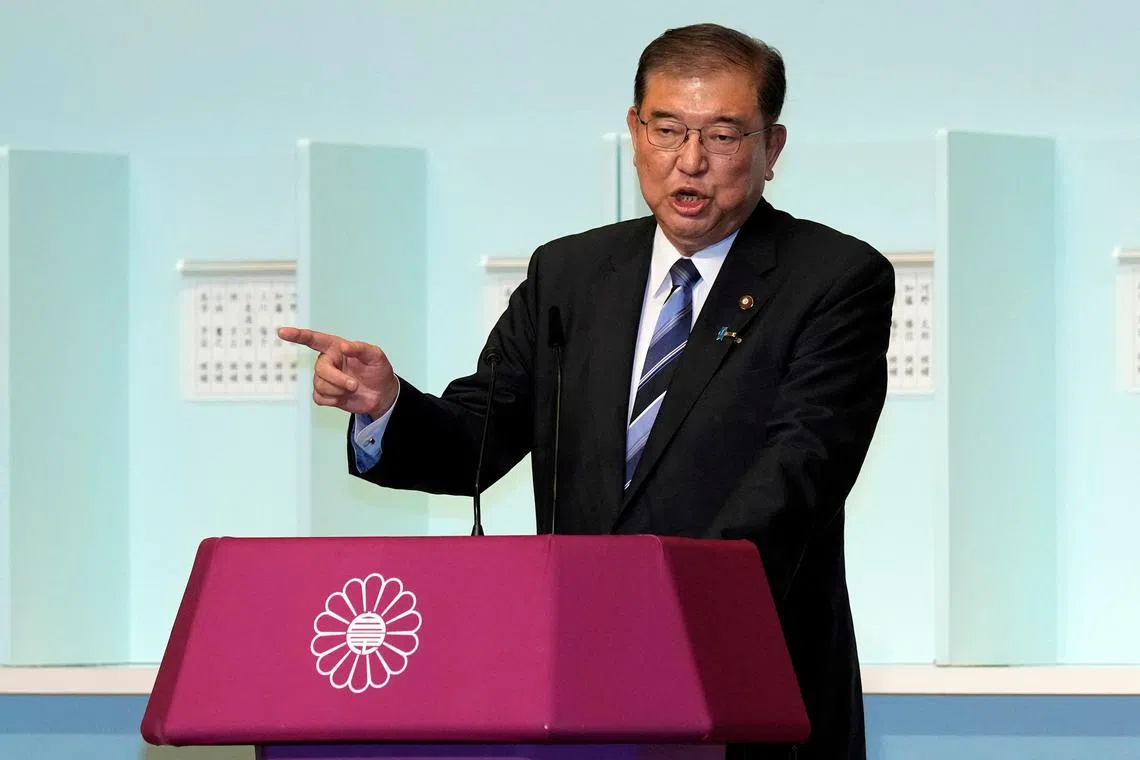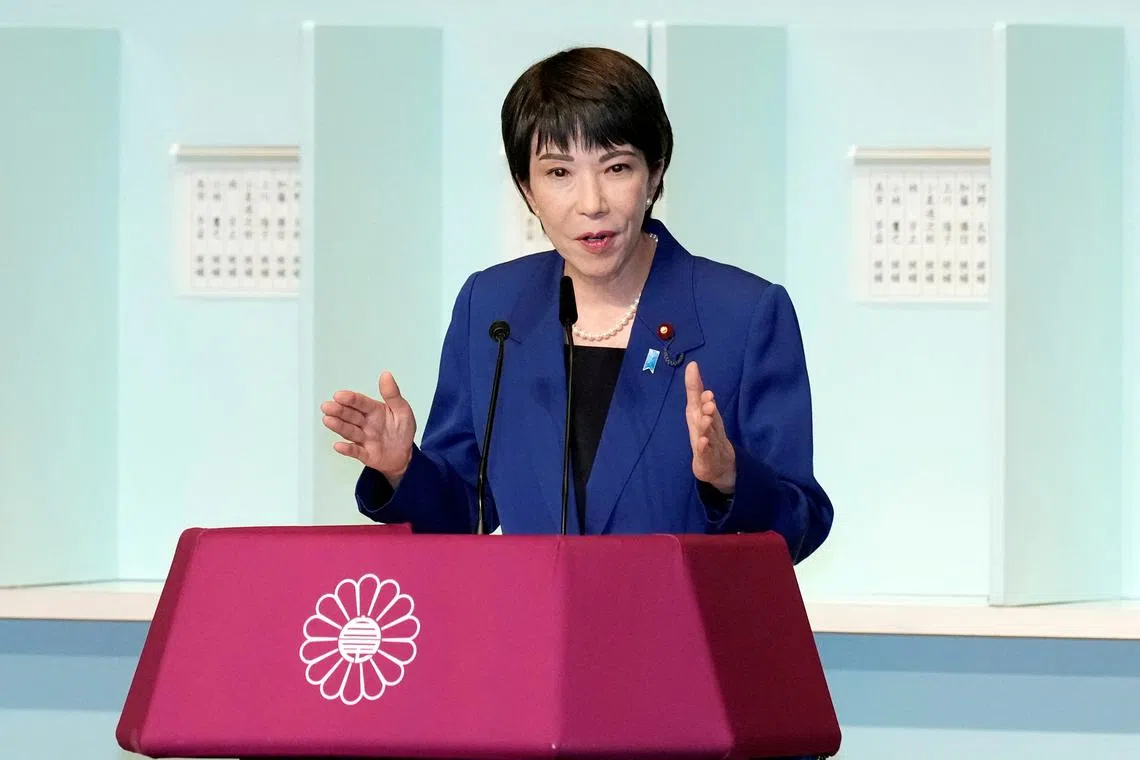Shigeru Ishiba succeeds in fifth bid to become Japan’s prime minister
Sign up now: Get insights on Asia's fast-moving developments

Mr Shigeru Ishiba will be sworn in by the Diet as Japan’s 102nd prime minister on Oct 1.
PHOTO: REUTERS
Follow topic:
TOKYO – Former defence minister Shigeru Ishiba has triumphed in his fifth bid to become Japan’s prime minister, emerging victorious in ruling party elections to succeed Mr Fumio Kishida.
On Sept 27, Mr Ishiba, 67, who was first elected to the Diet in 1986 and is considered a maverick outsider within the Liberal Democratic Party (LDP), beat out front runners who could have become Japan’s first woman prime minister or its youngest.
Mr Ishiba will be sworn in by the Diet as Japan’s 102nd prime minister on Oct 1, with Mr Kishida officially stepping down
The win caps an arduous climb to the pinnacle of Japanese politics for Mr Ishiba, whose past leadership bids failed due to his contrarian views and public spats with colleagues, including the late former prime minister Shinzo Abe.
Mr Ishiba pipped Economic Security Minister Sanae Takaichi, 63, a staunch conservative and Abe protege, in a run-off contest between the top two finalists after the first round failed to produce an outright winner.
He scored 215 votes, including 189 from lawmakers and 26 from prefectural chapters, to Ms Takaichi’s 194 votes that comprised 173 from lawmakers and 21 from prefectural chapters.
The slim difference in MP votes, analysts said, suggests a divided party that could herald a return to an era of short-lived prime ministers if Mr Ishiba fails to cement his power base.
His victory marked a stunning reversal, as Ms Takaichi had come out tops in the first round. Another favourite, former environment minister Shinjiro Koizumi, 43, failed to make the run-off after coming up short by 18 votes.

Japanese Economic Security Minister Sanae Takaichi speaking before the run-off election on Sept 27.
PHOTO: REUTERS
Mr Kishida, whose three years in office were plagued with high-profile scandals that tanked his support, vowed to support Mr Ishiba as a backbencher.
“We must accelerate our efforts to break out of deflation and achieve a growth economy. We must also fundamentally strengthen our defence and diplomacy, with the world now at a turning point in history,” he said. “Above all, we must implement policies that can resonate with the people.”
Mr Ishiba, meanwhile, promised to “lead the party back to our roots as one that speaks the truth freely and honestly, is fair and impartial in all things, and is always humble”.
He hinted that he would fill his Cabinet and LDP executive positions with rivals who competed alongside him, and said he would call a snap election “as soon as possible” to secure a public mandate.
Mr Ishiba hails from the town of Yazu in Japan’s least populated Tottori prefecture, where he launched his winning campaign.
His key policy pledges include measures to promote regional revitalisation, the creation of a new Disaster Management Agency and the initiation of an Asian version of the Nato (North Atlantic Treaty Organisation) military alliance.
On Sept 27, Japan’s neighbours China and South Korea said they looked forward to working closely with Mr Ishiba to build positive ties going forward.
In Beijing, Chinese Foreign Ministry spokesman Lin Jian said: “The long-term, sound and steady development of China-Japan relations serves the fundamental interests of the two peoples. It’s the only appropriate choice.”
The LDP election was also closely watched by currency markets, with the yen reacting sharply against the US dollar during the race. The yen briefly plunged to 146.21 against the US dollar when Ms Takaichi looked likely to win, before surging to 143.34 when Mr Ishiba’s victory was confirmed.
Ms Takaichi opposes the Bank of Japan’s efforts to raise interest rates further away from historic lows, while Mr Ishiba has endorsed the central bank’s rate hikes.
The LDP wants to turn a new page through a leadership election where change and reform were the buzzwords, after a series of high-profile scandals that hurt its standing.
These included revelations of the LDP’s cosy ties with the controversial Unification Church, which has been branded as a cult in some countries, and a massive slush fund scandal that implicated nearly one in five LDP lawmakers.
Mr Ishiba will need to clean up the party’s image, bridge divisions that have surfaced in the hustings and regain public trust, all while steering Japan through intensifying geopolitical tensions and growing public disaffection over issues such as the rising costs of living and a lack of gender equality.
He will face off against a new leader of the opposition in the upcoming national elections. On Sept 23, the Constitutional Democratic Party of Japan elected centrist former prime minister Yoshihiko Noda, 67, as its leader.
The LDP’s junior coalition partner, Komeito, will also have a fresh face in charge. Secretary-general Keiichi Ishii, 66, will succeed Mr Natsuo Yamaguchi, 72, as party chief on Sept 28, with the latter stepping down after 15 years at the helm.
Mr Ishiba is a 12-term lawmaker who once held the record as Japan’s youngest lawmaker when he was first elected to the Diet at the age of 29.
His father Jiro Ishiba was a former Tottori governor, while his mother was a Japanese teacher.
A law graduate from the elite Keio University in Tokyo, he started out as a banker before entering politics after his father died in 1981, at the encouragement of their family friend, former prime minister Kakuei Tanaka.
A self-professed military geek and train otaku, he is an ardent builder and collector of plastic military and train models.
Mr Ishiba, a rare Christian politician in a country where Shinto and Buddhism are the dominant religions, is married with two daughters.


